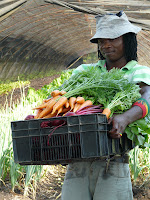It isn't so much that I didn't know that, or that I hadn't tried it... it was the copious amounts of the stuff that he used. And the age. Everything had been aged very well. The mix was placed mostly above the level of the soil, and watered and planted. Our annual rainfall is high, so in areas with less rainfall and especially sandy soil, building the beds up so would probably be counter-productive.
The veggies grew and the harvest came, and then so did the diseases and insects and that was when we crossed swords. My pensioned helper didn't care how poisonous a substance was, and whether I even knew he had sprayed it on food I might harvest that weekend or not, as long as his veggies looked stunning he was happy. My stomach turned and I became very suspicious of everything, not wanting to poison myself and my family. We had many arguments and he disdainfully dismissed my notion of wanting my veggies to be chemical free. It led to the parting of the ways, but I had learned. Lots and lots and lots of organic material. Therein lies the success of growing vegetables, and the phrase 'organic vegetables' jumped to mind. I had an epiphany, the first of many: The concept rises and falls on the strata they are planted in.
I abandoned the tainted plot and moved the vegetable project into a tunnel that had housed plants before, and where nothing had been planted in the ground. The luxury market of ornamental plants was failing to deliver and we needed to diversify. Tractor loads of compost was brought in and beds built up above soil level. The structure of the soil itself had been compromised with compacting feet and heavy plants for years


so I had no confidence in it, preferring to raise the beds above it.
 The first seedlings went in
The first seedlings went in and in spite of a number of prophets of doom, we had a measure of success. When disease hit, if I didn't have an organically sound manner of dealing with it, the plants were removed and discarded, the beds rebuilt and fresh
and in spite of a number of prophets of doom, we had a measure of success. When disease hit, if I didn't have an organically sound manner of dealing with it, the plants were removed and discarded, the beds rebuilt and fresh 
 seedlings planted.
seedlings planted.The second year it seemed as if the plants grew better and were more resistant to disease. We had also physically dug up and eliminated cutworm in such large numbers they seemed to have been beaten, with a little resurgence now and again. This didn't go down without losses, because it is only when you see a plant lying flat on the ground with no roots, that you know the cutworm is there. Checking the beds first thing in the morning became the norm, because that is when you catch them just there, resting after their meal.
We started selling at a monthly farmer's market,
and also boxes of fresh veg to our home town of Barberton. We called it Farm-in-a-box.
 By the third year I knew it was not my imagination. The vegetables just kept on improving, growing bigger and better, and more naturally disease resistant. The soil had been conditioned over and over again without the digging and subsequent damage to the structure. The more I planted the more I learned. Not only are there earthworms that aerate the soil, that we all know exist where organic practices are observed. There are also micro-organisms that tunnel around, making it possible for the little hair roots of the plants to follow where they have dug, all of which comes to naught if the soil is turned and dug over, let alone ploughed (my personal bugbear).
By the third year I knew it was not my imagination. The vegetables just kept on improving, growing bigger and better, and more naturally disease resistant. The soil had been conditioned over and over again without the digging and subsequent damage to the structure. The more I planted the more I learned. Not only are there earthworms that aerate the soil, that we all know exist where organic practices are observed. There are also micro-organisms that tunnel around, making it possible for the little hair roots of the plants to follow where they have dug, all of which comes to naught if the soil is turned and dug over, let alone ploughed (my personal bugbear).During the three years we were doing our trials and selling good vegetables already, we had a kindly rep from a chemical company regularly paying us visits and trying to convince us that if the container says you can safely eat the vegetables after such and such a number of days, it meant there was no residue of that chemical left on that plant after that time, or it was so insignificant it made no difference and would certainly not poison anyone ingesting it. We didn't bite - pun unintended.
FJ found our rep standing at the entrance to a tunnel the one day, just looking. When they had greeted, he said to FJ: "You know son, I have been growing vegetables for 30 years in this valley, but I tell you the truth, I have never grown vegetables this good in all that time."
He hasn't been back.


Oh Auntie A, you have made so many changes to the farm since I was last there 8 years ago. (Far too long!) I hope and pray that I can come visit you again soon and see your gorgeous veg up close and personal!
ReplyDeleteWe are becoming more and more like country hicks, you really won't know us for the city slickers we once were. Pepper (the piglet) is keeping my feet warm as I'm writing this.
ReplyDelete